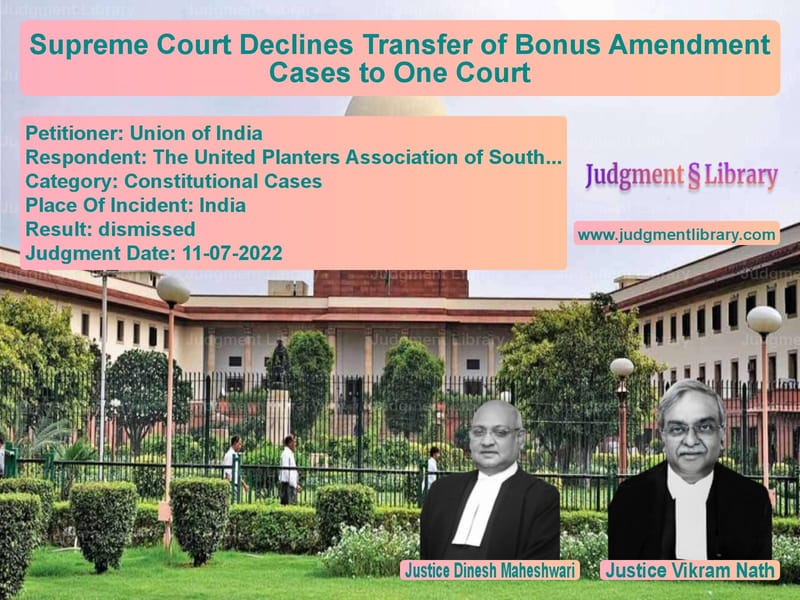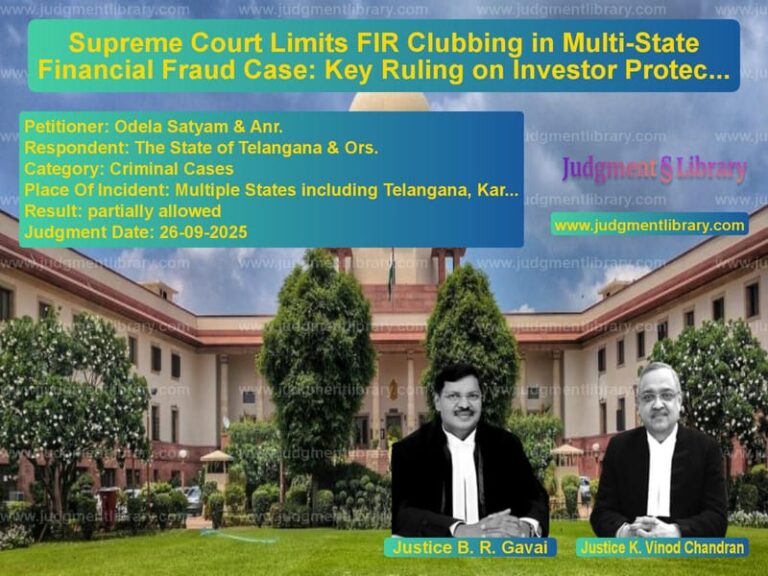Supreme Court Declines Transfer of Bonus Amendment Cases to One Court
The case of Union of India vs. The United Planters Association of Southern India & Others deals with the constitutional validity of the Payment of Bonus (Amendment) Act, 2015. The Supreme Court was called upon to decide whether multiple writ petitions challenging the Act should be transferred to one High Court or heard separately in different High Courts. The case highlights the complexities of dealing with large-scale statutory amendments that impact multiple industries across various states.
Background of the Case
The Union of India sought the transfer of multiple writ petitions challenging the Payment of Bonus (Amendment) Act, 2015. These petitions were pending before various High Courts, and the government argued that transferring them to one forum would ensure consistency in judicial interpretation.
The Amendment Act of 2015 made two major changes:
- Salary Limit Increase: The eligibility salary limit for employees covered under the Bonus Act was raised from Rs. 10,000 to Rs. 21,000 per month.
- Bonus Calculation Change: The wage ceiling for calculating the bonus was increased from Rs. 3,500 to Rs. 7,000 per month or the minimum wages for scheduled employment, whichever is higher.
The government sought to apply these changes retrospectively from April 1, 2014, which led to widespread litigation from companies and business associations.
Petitioner’s (Union of India) Arguments
The Additional Solicitor General, representing the government, argued:
- Multiple writ petitions in different High Courts could lead to contradictory rulings, which would create confusion.
- The Amendment Act impacted industries nationwide, making it necessary for a single authoritative decision to be made.
- Given the financial implications, delaying a final decision would negatively impact both businesses and employees.
- Transferring all cases to the Supreme Court or a single High Court would ensure judicial consistency and streamline the litigation process.
Respondents’ (Business Associations and Companies) Arguments
Various business groups and state governments opposed the transfer, arguing:
- The constitutional framework allows High Courts to decide cases independently, and the possibility of different rulings is not a valid reason for transfer.
- The government’s request violated the principles of federalism, as labor laws have different regional impacts.
- Different states have varying minimum wage structures, which affect how the bonus is calculated, making it necessary for multiple courts to handle cases separately.
- Many businesses had already secured interim relief from their respective High Courts, and transferring cases would delay justice.
Supreme Court’s Observations
The Supreme Court, comprising Justices Dinesh Maheshwari and Vikram Nath, reviewed the request and ruled that:
“The likelihood of divergence of views, looking to the framework of the statute itself, cannot be a ground for transfer.”
The Court emphasized the following points:
- The Payment of Bonus Act involves calculations based on state-specific minimum wages, making it impractical for a single court to decide all matters.
- The principle of judicial decentralization allows High Courts to handle cases independently, and parties retain the right to appeal to the Supreme Court.
- Transferring cases to the Supreme Court would burden the apex court with first-instance adjudication, which is contrary to its role as a constitutional court.
- The Court had previously rejected similar transfer petitions in taxation cases where multiple High Courts were hearing challenges to a central law.
Final Ruling
The Supreme Court dismissed the transfer petitions and vacated the interim stay orders that had halted proceedings in some High Courts. The ruling stated:
“Accordingly, the prayer for transfer of the subject petitions is declined, and all interim stay orders are vacated while providing that it shall be permissible for the parties to request the respective High Courts for expeditious hearing and disposal of the pending writ petitions.”
Key Takeaways
- High Courts can continue hearing cases: The Supreme Court reaffirmed the independence of High Courts in adjudicating constitutional matters.
- Judicial decentralization is important: The Court rejected the notion that all similar cases must be decided by one court.
- Retrospective application of laws remains controversial: Businesses continue to challenge the retroactive implementation of tax and labor laws.
- Different states have different wage structures: Bonus calculations depend on state-specific minimum wages, making a centralized ruling impractical.
Conclusion
The ruling in Union of India vs. The United Planters Association of Southern India reinforces the importance of judicial federalism and highlights the limits of centralizing legal challenges. By allowing High Courts to proceed with separate cases, the Supreme Court upheld the constitutional principle that state courts play a crucial role in adjudicating labor and taxation laws.
Petitioner Name: Union of India.Respondent Name: The United Planters Association of Southern India & Others.Judgment By: Justice Dinesh Maheshwari, Justice Vikram Nath.Place Of Incident: India.Judgment Date: 11-07-2022.
Don’t miss out on the full details! Download the complete judgment in PDF format below and gain valuable insights instantly!
Download Judgment: union-of-india-vs-the-united-planters-supreme-court-of-india-judgment-dated-11-07-2022.pdf
Directly Download Judgment: Directly download this Judgment
See all petitions in Fundamental Rights
See all petitions in Legislative Powers
See all petitions in Public Interest Litigation
See all petitions in Separation of Powers
See all petitions in Other Cases
See all petitions in Judgment by Dinesh Maheshwari
See all petitions in Judgment by Vikram Nath
See all petitions in dismissed
See all petitions in supreme court of India judgments July 2022
See all petitions in 2022 judgments
See all posts in Constitutional Cases Category
See all allowed petitions in Constitutional Cases Category
See all Dismissed petitions in Constitutional Cases Category
See all partially allowed petitions in Constitutional Cases Category







